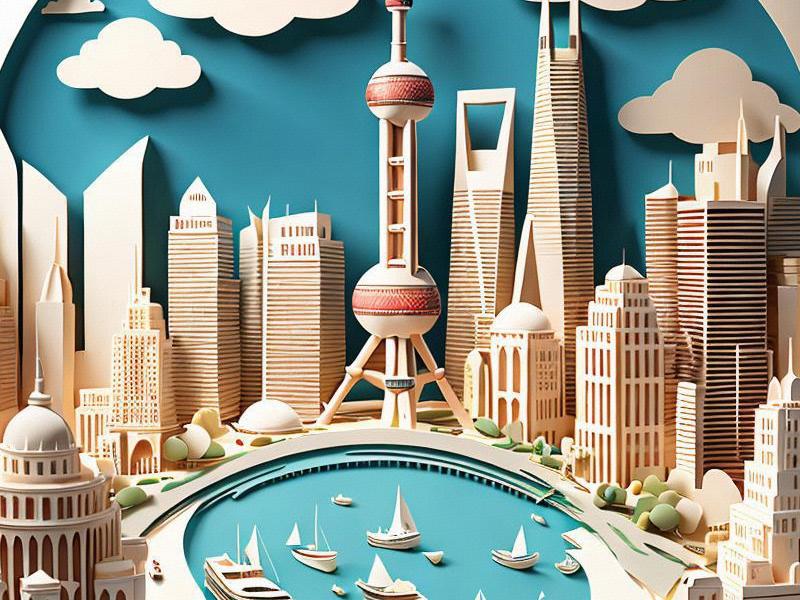Shanghai, often referred to as the "Pearl of the Orient," has long been a symbol of China's economic and cultural transformation. As one of the world's most dynamic cities, Shanghai serves as a vital gateway to East Asia, connecting the region with the global economy. This article delves into the multifaceted role of Shanghai as a gateway to the East, exploring its historical significance, economic prowess, urban development, and cultural influen

Shanghai's history dates back to the 11th century, but it was during the 19th century that the city began to emerge as a global hub. The opening of the Treaty Ports in 1842 following the First Opium War marked the beginning of Shanghai's transformation into a cosmopolitan city. The establishment of the International Settlement and the French Concession brought together people from diverse cultural and national backgrounds, creating a unique blend of East and West.
The city's strategic location at the mouth of the Yangtze River made it a natural gateway for trade between China and the rest of the world. By the early 20th century, Shanghai had become one of the largest and most prosperous cities in the world, known for its bustling markets, vibrant nightlife, and cutting-edge architecture. The Bund, with its colonial-era buildings, stands as a testament to this era of rapid growth and international influence.
In the latter half of the 20th century, Shanghai experienced significant changes as China underwent major political and economic shifts. During the Maoist era, the city's focus shifted from commerce to industry, and it became a center for heavy manufacturing. However, the economic reforms initiated by Deng Xiaoping in 1978 marked a new chapter for Shanghai. The city was designated as one of China's first Special Economic Zones, paving the way for rapid urbanization and economic growth.
Today, Shanghai is recognized as the financial and economic capital of China. Its skyline is dominated by iconic skyscrapers such as the Shanghai Tower, the Jin Mao Tower, and the Oriental Pearl Tower, symbolizing the city's status as a global financial hub. The Shanghai Stock Exchange is one of the largest in the world, and the city is home to numerous multinational corporations, banks, and financial institutions.
爱上海论坛
The Port of Shanghai is the busiest container port in the world, handling billions of tons of cargo annually. This port serves as a critical link in global trade networks, facilitating the movement of goods between East Asia, Europe, and North America. The development of the Shanghai Free Trade Zone has further enhanced the city's role as a gateway to international markets, offering streamlined customs procedures and tax incentives to businesses.
Urban development in Shanghai has been nothing short of remarkable. The city has undergone a massive transformation, with new districts and infrastructure projects reshaping its landscape. Pudong, once a rural area on the eastern side of the Huangpu River, has become a symbol of modernity and innovation. The Lujiazui Financial District, with its gleaming skyscrapers, is a testament to Shanghai's ambition to be a global financial center.
Public transportation in Shanghai is highly efficient and extensive, with the metro system being one of the busiest in the world. The city has also invested heavily in green initiatives, aiming to become a more sustainable urban environment. The Bund's waterfront promenade, the Huangpu River cruise, and the numerous parks and green spaces offer residents and visitors a chance to enjoy the city's natural beauty amidst its urban sprawl.
爱上海419论坛
Culturally, Shanghai is a melting pot of traditions and modernity. The city is known for its rich culinary heritage, with dishes such as xiaolongbao (soup dumplings) and shengjianbao (pan-fried dumplings) being beloved by locals and tourists alike. The vibrant art scene, with galleries, theaters, and music venues, reflects the city's dynamic cultural landscape.
Shanghai has also played a pivotal role in China's film industry. The city is home to the Shanghai International Film Festival, one of the most prestigious film festivals in Asia. The historic French Concession, with its charming streets and cafes, remains a popular destination for those seeking to experience the city's colonial past.
Education is another area where Shanghai excels. The city is home to some of China's top universities, including Fudan University and Tongji University, attracting students from around the world. These institutions contribute to Shanghai's reputation as a center of learning and innovation.
上海品茶网
Despite its many achievements, Shanghai faces challenges in maintaining its position as a global gateway. Rapid urbanization has led to issues such as traffic congestion, air pollution, and housing shortages. The city government has implemented various measures to address these challenges, including the expansion of public transportation, the promotion of green technologies, and the development of affordable housing projects.
The future of Shanghai as a gateway to the East will depend on its ability to adapt to the changing dynamics of globalization. As technology continues to advance, the city must invest in digital infrastructure and innovation to remain competitive. The Belt and Road Initiative, launched by China, presents new opportunities for Shanghai to strengthen its connections with other regions of the world.
In conclusion, Shanghai's role as a gateway to the East is multifaceted, encompassing its historical significance, economic prowess, urban development, and cultural influence. The city's ability to balance tradition and modernity, while addressing the challenges of rapid growth, will determine its continued success on the global stage. As Shanghai continues to evolve, it remains a beacon of hope and opportunity for the people of East Asia and beyond.